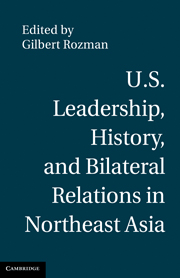Book contents
- Frontmatter
- Contents
- List of Contributors
- Acknowledgments
- U.S. Leadership, History, and Bilateral Relations in Northeast Asia
- Introduction
- PART I HISTORICAL MEMORIES AND BILATERAL TIES WITH ALLIES
- 1 Japan's Historical Memory toward the United States
- 2 Values and History in U.S.–South Korean Relations
- 3 U.S. Leadership, History, and Relations with Allies
- PART II HISTORICAL MEMORIES, JAPANESE–SOUTH KOREAN RELATIONS, AND U.S. VALUES
- PART III HISTORICAL MEMORIES, SINO–SOUTH KOREAN RELATIONS, AND U.S. VALUES
- Index
- References
1 - Japan's Historical Memory toward the United States
from PART I - HISTORICAL MEMORIES AND BILATERAL TIES WITH ALLIES
Published online by Cambridge University Press: 01 March 2011
- Frontmatter
- Contents
- List of Contributors
- Acknowledgments
- U.S. Leadership, History, and Bilateral Relations in Northeast Asia
- Introduction
- PART I HISTORICAL MEMORIES AND BILATERAL TIES WITH ALLIES
- 1 Japan's Historical Memory toward the United States
- 2 Values and History in U.S.–South Korean Relations
- 3 U.S. Leadership, History, and Relations with Allies
- PART II HISTORICAL MEMORIES, JAPANESE–SOUTH KOREAN RELATIONS, AND U.S. VALUES
- PART III HISTORICAL MEMORIES, SINO–SOUTH KOREAN RELATIONS, AND U.S. VALUES
- Index
- References
Summary
I face two difficulties in writing a chapter on Japan's historical memory toward the United States. First, for a Japanese to write a chapter as an analyst summarizing the debate in Japan on the subject objectively is not easy. I have lived my life with the controversy on historical memory, and I cannot dissociate myself entirely from the judgments which I have made in these years. Also, because of my past involvement with this issue, my chapter will be interpreted with a certain value judgment by any reader, Japanese or foreigner, whether I like it or not. Second, to give an adequate analysis covering the political left, right, and center as distinct threads of Japanese thinking on historical memory is a voluminous task that goes beyond the scope of this chapter. Nevertheless, there are two reasons that propelled me to write this paper. First, although the United States has never been a major factor in Japan's historical memory controversy, and there is no reason to make it a major factor at this point, Japan's historical memory toward the United States has always been in the consciousness of the Japanese as an underlying theme of Japanese identity and values since the end of World War II. Proper analysis of Japan's historical memory toward the United States, distinguishing democratic values and national identity, could clarify the state of political thought in Japan in a new way.
- Type
- Chapter
- Information
- Publisher: Cambridge University PressPrint publication year: 2010
References
- 1
- Cited by

